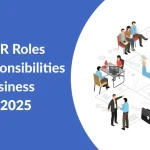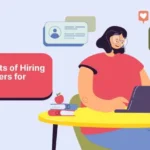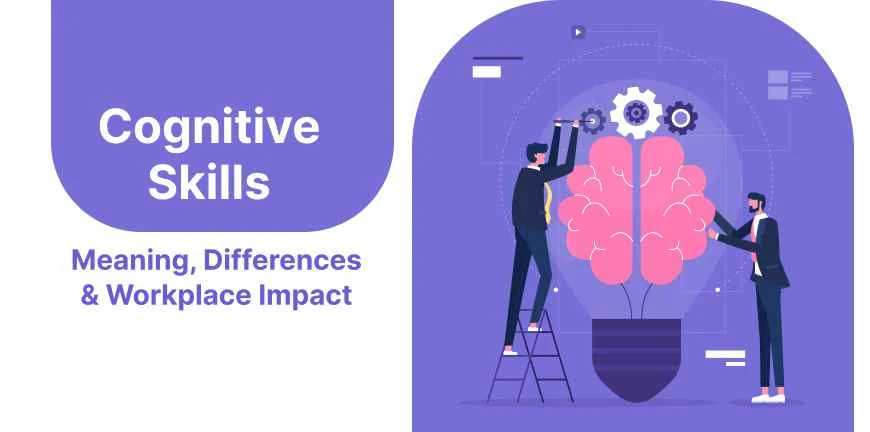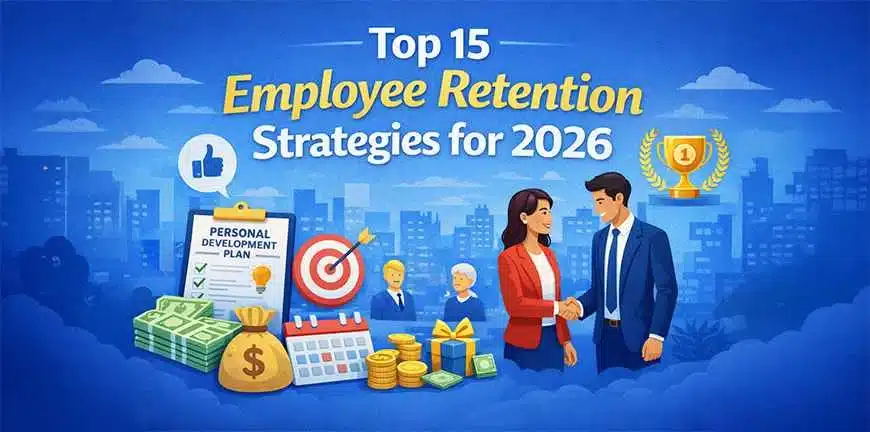
21 Key HR Roles and Responsibilities in 2026 – Complete Guide
22/12/2025
Top 10 Benefits of Hiring Remote Workers for Businesses
22/12/2025- Cognitive Skills vs Cognitive Ability: Key Differences
- Why Are Cognitive Skills Important in the Workplace?
- How Are Cognitive Skills and Cognitive Abilities Used at Work?
- What Types of Cognitive Skills Exist?
- How Do Cognitive Skills Impact Employee Performance?
- Can Cognitive Skills Be Improved Over Time?
- How Do Organisations Assess Cognitive Skills?
- How Do Cognitive Skills Compare with Technical Skills and Soft Skills?
- Why Do Cognitive Skills Matter More in the Age of AI and Automation?
- What Are Common Myths About Cognitive Skills and Intelligence?
- When Should Organisations Invest in Cognitive Skill Development Programs?
- Key Takeaways
- Frequently Asked Questions
What Are Cognitive Skills? Cognitive Skills vs Cognitive Ability: Key Differences Why Are Cognitive Skills Important in the Workplace? How Are Cognitive Skills and Cognitive Abilities Used at Work? What Types of Cognitive Skills Exist? How Do Cognitive Skills Impact Employee Performance? Can Cognitive Skills Be Improved Over Time? How Do Organisations Assess Cognitive Skills? How Do Cognitive Skills Compare with Technical Skills and Soft Skills? Why Do Cognitive Skills Matter More in the Age of AI and Automation? What Are Common Myths About Cognitive Skills and Intelligence? When Should Organisations Invest in Cognitive Skill Development Programs? Key Takeaways Frequently Asked Questions
The definition of success in the new world is not just defined by the skills you possess or the knowledge you have. To truly reach the pinnacle of success, what also matters is the way you think and how you think. Just like Albert Einstein said, “Education is not the learning of facts, but the training of the mind to think.”
Today, employers are picking candidates with strong cognitive skills, who can learn and grasp concepts quickly, and then training them with the technical skills they need to be adept at their jobs.
If you are focusing on enhancing innovation, performance and leadership, then the cultivation of intelligent thinking, logical rationale, memory, attention span and learning capabilities. Cognitive skills become integral to your business as your operations grow and shift to knowledge-powered roles from task-led work.
A 2025 Deloitte study found that 66% of managers believe recent hires are underprepared. This has led to a “flight to cognitive ability”—employers are prioritising candidates who show high learning agility (ability) over those who merely have a static list of past skills
Let us walk you through the various aspects of cognitive skills and ability and their impact on the workplace:
Cognitive skills are a set of built-in skills that exist in the brain on a neurological level. These skills include listening, perception, and attention. They are often second nature and used without our conscious knowledge. Developing and paying attention to your cognitive abilities can help in a bigger way than you imagine, helping you succeed in your career.
Cognitive Skills vs Cognitive Ability: Key Differences
| Aspect | Cognitive Skills | Cognitive Ability |
| Meaning | Specific mental skills are used to perform tasks and solve problems | Overall mental capacity to think, learn, reason, and understand |
| Nature | Practical and task-oriented | Broad and foundational |
| Scope | Narrow and skill-specific | Wide and general |
| Examples | Memory, attention, problem-solving, reasoning, verbal skills | Intelligence, learning capacity, reasoning potential |
| Measurement | Assessed through skill-based tests or task performance | Measured through IQ tests or general cognitive assessments |
| Development | Can be improved through practice and training | Relatively stable, but can be strengthened over time |
| Application | Used in daily tasks, academics, and job roles | Determines how |
Why Are Cognitive Skills Important in the Workplace?
Cognitive skills are extremely important to have in the workplace because a wide range of perspectives can always contribute to innovative ideas and better solutions. Whether it is interpreting and assessing or analysing data or listening and retaining information during meetings, cognitive skills are invaluable to accelerating team functioning. Not only that, but an environment that is rich in cognitive diversity can also contribute to company culture.
A workplace that has a high energy of cognitive diversity encourages employees to be themselves and share their unique perspectives. This leads to a more positive and productive work environment. It helps to create a sense of community within a company, as employees bond over their shared values and goals.
Let us take a look at how cognitive skills enable employees to stand out in their workplace-
1. Problem-solving
Cognitive skills enable individuals to analyse complex problems, think critically, and produce innovative solutions. The boom of technological advancements has given rise to new challenges, making employees with exceptional cognitive skills gain traction in the workplace as they are better equipped to navigate and address them effectively.
2. Adaptability
Flexibility, creativity, and the ability to learn quickly are skills that do not come easily to everyone. Remember, technical skills can be taught, but not cognitive skills. An individual with exceptional cognitive skills can survive and thrive in even the most dynamic working environment, as they can acquire new knowledge, adapt to modern technologies, processes, and responsibilities.
3. Decision-making
It is not everyone’s or anyone’s cup of tea to become a successful decision maker. It is not uncommon that when a situation arises where a tough call needs to be taken, no one steps in. To be a decision maker, you need to have a high-risk appetite, think on your feet, reason logically, make sound judgments, weigh alternatives effectively, and make informed decisions.
4. Collaboration and communication
An individual with strong Cognitive skills is capable of successfully contributing to effective collaboration and communication in the workplace. Strong cognitive skills facilitate active listening, clear expression of ideas, and understanding different perspectives, enhancing teamwork, enabling effective negotiation, and fostering a positive work environment.
5. Creativity and imagination
To survive and excel in a rapidly evolving business landscape, employees who have a greater sense of imagination, can think creatively, and generate innovative ideas are highly valued at the workplace. Individuals with a higher imagination and curiosity are more likely to produce ideas to develop new products, services, and processes that drive growth and competitive advantage.
6. Emotional intelligence
While technical skills remain important, the significance of emotional intelligence is growing in the workplace. Cognitive skills related to emotional intelligence, such as empathy, self-awareness, and social awareness, enable employees to navigate interpersonal relationships, resolve conflicts, and collaborate effectively with colleagues and clients. A McKinsey Global Survey on reskilling found the proportion of companies addressing empathy and interpersonal skills doubled in 2020.
7. Agile Thinking
Employees who learn and adapt quickly to competencies that do not fall under their area of expertise are most likely to stand out to employers. Agile thinking is thinking laterally at a moment’s notice and having a backup plan or two, and being willing to learn from mistakes and grow to become an asset to the organisation.
8. Prioritisation and time management
Understanding the skill of managing time and prioritisation is a winning trait for an individual. However, with adaptability and agility at a premium, the capability to juggle and prioritise various tasks, with limited time at hand, will be a sought-after and vital skill to advance in the future world of work.
How Are Cognitive Skills and Cognitive Abilities Used at Work?
Cognitive skills and abilities play an integral role in how people perform at work, learn and grow. Although the two are closely related, their application slightly differs across situations and job roles. Let us find out what they are:
Execution of Cognitive Skills at Work
- Handling priorities well, eliminating errors, meeting deadlines, etc.
- Correctly applying methods or steps, understanding client details, and having thorough product knowledge.
- Resolving problems, enhancing processes, and managing exceptional cases.
- Making intelligent and wise decisions, analysing information judiciously, and avoiding bias.
- Facilitating transparent communication, authentic reporting, negotiations, and proper budgeting.
What Types of Cognitive Skills Exist?
Let us now look at the different types of cognitive skills and abilities that are interconnected and enable us to process information and make smart decisions.
- Attention- this is the ability to have a focused approach, concentrate fully, discarding all distractions.
- Memory- the memory aspect is very important as it helps in storing and retrieving various kinds of information.
- Logic & Reasoning- Evaluating, solving critical issues, and making rational judgements.
- Processing Speed- This is the brain working quickly to collect information, analyse it and use the information.
- Language- The process of understanding and using written and spoken communication.
- Perception- the interpretation of sight and sound correctly.
How Do Cognitive Skills Impact Employee Performance?
Cognitive skills development and abilities are crucial to employee performance. They are powerful enablers of quick learning, better decision-making, and handling complex situations. Let us find out how it impacts performance:
1. Adaptive Agility
Employees possessing higher cognitive ability can easily comprehend complex concepts and structures, learn new and improved skills quickly, and adjust to evolving landscapes, shaping them to be better performers in vibrant environments.
Use case- IBM emphasises critical thinking, systems thinking, and continuous learning through AI-enabled learning platforms. This results in faster reskilling, improved decision quality, and higher productivity in complex technology and consulting roles.
2. Analytical Judgement
Strengthened cognitive skills potentially help in evaluating situations better, think critically and solve issues faster with more information, better reasoning and logical explanations.
3. Productivity & Efficiency
The process of solving problems easily and understanding critical situations fast and accurately enhances productivity and efficiency, enabling organisations to achieve their desired outcomes.
4. Role Scope
Cognitive skills primarily drive complicated and strategic thinking and reasoning, while certain skills are useful for daily task execution, affecting performance across roles and positions. It can impact leadership roles to blue-collar roles.
Can Cognitive Skills Be Improved Over Time?
It is possible to boost Cognitive skills and ability over time. Although the extent of improvement depends on factors like age, ability, etc. If you are an organisation keen on accelerating the cognitive skills and abilities of your workplace environment, you can do so by following these tips:
- Design structures that encompass roles that are rich in learning.
- Utilise training models based on case studies, real-life scenarios, and stimulations.
- Encourage analysis and evaluations instead of pointing fingers.
- Invest in training, mentoring and coaching processes.
How Do Organisations Assess Cognitive Skills?
To stimulate your workplace demands and successfully predict job performances, you as an organisation must know how to assess cognitive skills and abilities effectively. Let us see how:
| Type of Test | What It Measures | How It Works / Typical Use Cases |
| General Cognitive Ability Tests | Overall intellectual capacity and learning ability | Broad assessment of reasoning, learning speed, and mental flexibility; ideal for multitasking and complex roles |
| Verbal Reasoning Tests | Language comprehension, grammar, and vocabulary | Evaluates ability to understand written information, communicate clearly, and reason with language; common in sales, legal, and customer-facing roles |
| Numerical Reasoning Tests | Quantitative thinking and data interpretation | Tests ability to analyse numbers, charts, and graphs to make decisions; widely used in finance, analytics, and technology roles |
| Logical / Abstract Reasoning Tests | Pattern recognition and abstract thinking | Measures how well candidates identify patterns and relationships in unfamiliar data; useful for strategy, research, and problem-solving roles |
| Spatial Reasoning Tests | Visual and spatial awareness | Assesses ability to visualise objects, layouts, and movements in space; relevant for engineering, architecture, and design roles |
| Memory & Attention Tests | Focus, concentration, and short-term recall | Evaluates ability to retain information, manage details, and sustain attention; important for roles requiring accuracy and consistency. |
| Business-Specific Cognitive Tests | Applied business judgement and real-world problem-solving | Simulates workplace scenarios to assess decision-making and business reasoning; e.g., Hogan Business Reasoning Inventory (HBRI) for managerial and leadership roles |
How Do Cognitive Skills Compare with Technical Skills and Soft Skills?
| Aspect | Cognitive Skills | Technical Skills | Soft Skills |
| Definition | Mental abilities used to think, learn, reason, and solve problems | Job-specific knowledge and expertise are required to perform tasks | Interpersonal and behavioural traits that shape how people work with others |
| Focus | How people think | What people know how to do | How people behave and interact |
| Examples | Critical thinking, problem-solving, reasoning, memory, and attention | Coding, accounting, data analysis, and machine operation | Communication, teamwork, leadership, and adaptability |
| Nature | Foundational and transferable across roles | Role-specific and task-based | Broad and situational |
| Trainability | Developable with practice and cognitive training | Learned through education, training, and experience | Developed through experience, coaching, and feedback |
| Measurement | Cognitive ability and reasoning tests | Skill tests, certifications, and practical assessments | Behavioural interviews, 360° feedback, observations |
| Role in Performance | Enables faster learning and better decision-making | Ensures accurate and efficient task execution | Influences collaboration, culture, and leadership effectiveness |
| Relevance Across Roles | High – applies to most jobs | Medium – varies by role | Highly relevant in all roles |
| Impact on Adaptability | Strong – supports learning and problem-solving in new situations | Mod |
Why Do Cognitive Skills Matter More in the Age of AI and Automation?
The age of AI and automation is a revolutionary phenomenon, and you can stay ahead in this competitive era if you utilise AI platforms and tools combined with cognitive skills, driving accelerated operations.
1. Judgment and Intelligent Thinking
AI tools and platforms are advanced, and they can provide volumes of data swiftly. However, it is always the human involvement that helps in processing the data. The human skills and intelligence required to assess the data are significant. They enable separating facts from opinions.
2. Innovative Thinking
AI is an expert in spotting patterns and generating data accordingly, but original concepts and innovation can only be generated by human thinking abilities. Humans can establish an emotional connection and bring life to contexts.
3. Learning and Adaptation
Flexible cognitive abilities enable humans to learn and adapt to new AI-driven technologies, excelling in the domain and contributing to the technological revolution. They emerge as enhanced AI collaborators leading processes.
4. Problem Tackling Abilities
Humans have mastered the art of managing and solving problems smartly, which AI is incapable of doing. They can understand and analyse broader aspects that AI cannot handle and comprehend.
5. Context Driven Judgment
AI needs to be backed by humans in terms of understanding nuances and subtleties, as they have a better understanding of contexts, theories and in-depth meanings to cater to the required demands and objectives.
What Are Common Myths About Cognitive Skills and Intelligence?
There are certain common myths about cognitive skills and intelligence that we come across. Let us find out about them:
- Intelligence is static and cannot be altered
- Intelligence can be measured only by IQ
High intelligence guarantees success.
If you are good at academics only, then you are intelligent - AI surpasses humans in intelligence
- Training is not for smart people
- Cognitive skills are essential only for niche, technical and senior roles
When Should Organisations Invest in Cognitive Skill Development Programs?
The true cognitive skills are properly defined and established when organisations are involved in cognitive skill development programs. Here are some situations where you, as a business, must consider investing in such programs:
- When assessments project that employees are grappling with complicated tasks or data evaluations.
- Situations where AI and modern technology alter job demands, basic cognitive skills are reduced in some areas, while creative developments and advanced levels of analysis become more prominent
- When the development of employees’ cognitive capabilities demonstrates growth prospects.
- Building a capable and intelligent manpower and teams that can adjust to future innovations, trends, need for creating a structure that supports cognitive training.
Alp Consulting Ltd assists companies in nurturing and developing an ecosystem that fosters cognitive skills and abilities, driving businesses to the pinnacle of success.
Key Takeaways
- The way you think matters more than what you know
- CognitiveS kills Predicts Future Potential
- Cognitive Skills Drive Performance Across All Roles
- AI Amplifies the Need for Human Judgement and Creativity
- Cognitive Skills Can and Should Be Developed
Frequently Asked Questions
1. Are Cognitive Skills the Same or Different?
Cognitive ability is the foundation that nurtures and sharpens cognitive skills. The skills entail mental abilities like memory, attention, reasoning, etc.
2. Can cognitive skills change over time?
Yes, cognitive skills keep evolving throughout life, involving progress and decline.
3. Which jobs require strong cognitive skills?
Jobs in IT and Technology, like Software Developers, Data Scientists, Law & Finance, Healthcare, Science, etc, require cognitive skills.
4. How Do Cognitive Skills Compare with Emotional Intelligence (EQ)?
Cognitive skills focus on logic, reasoning, and problem solving, while EQ focuses on empathy, awareness and handling emotions.
5. Cognitive Skills vs Emotional Intelligence (EQ): What Matters More at Work?
Both are significant for work, but cognitive skills sometimes matter more as they aim at leadership, long-term success, and teamwork.
6. How Do Cognitive Skills Evolve Across Career Stages?
Cognitive skills peak during early adulthood, then decline a bit when the intelligence is crystallised and continue to develop throughout adulthood.
Contact Us For Business Enquiry

Rajkumar Shanmugam
Rajkumar Shanmugam is the Head of HR at ALP Consulting, bringing over 19 years of comprehensive HR leadership experience across India and international markets. His expertise spans talent acquisition, employee relations, performance management, compliance, and HR transformation. Rajkumar has a proven track record of driving people-centric initiatives, enhancing workplace culture, and aligning HR strategy with business goals. With extensive experience in US staffing operations and global mobility, he continues to lead organizational excellence through innovation and employee engagement.




